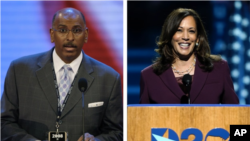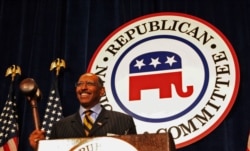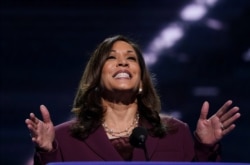Michael Steele has an idea of what Sen. Kamala Harris is facing as a trailblazer – the first Black woman and the first American of South Asian descent to be nominated for national office on the Democratic presidential ticket.
It starts with people having their own version of who they think you are.
“Everyone else has an expectation of what they think you will do, what they think you represent,” Steele says. “And then, they define it for you. So, it is a challenge, because people begin to see you through a lens that they have sort of created for themselves.”
Steele knows all about breaking barriers. In 2002, he became the first Black person elected to statewide office in Maryland, where he was lieutenant governor from 2003 to 2007. In 2009, Steele became the Republican National Committee’s first Black chairman.
Along the way, he has heard it all, especially the insinuations that he only got those jobs because he is African American.
“That is the weightiest of all the baggage, because it goes to the core of everything about you. Your qualifications, your skills, your intellect – all of that is brought into question when people just dismissively look at you and say, ‘You only got that job because you're Black,’” Steele says. “And so, that makes the job that much harder, because you sometimes fall into the trap of having to prove over and over again that I am smart. I am capable. I am qualified.”
Even when Black pioneers try to leave racist baggage behind, Steele says, detractors bring it up again. Harris is already getting a taste of it.
President Donald Trump has referred to Harris as “nasty,” “disrespectful,” a "mad woman" and "angry," invoking racist and sexist tropes of the “angry black woman.”
And, just as he fanned the false allegations that former President Barack Obama was not born in the United States, Trump has refused to discredit a Newsweek opinion piece that falsely suggests Harris does not qualify to be vice president or president because she is the daughter of immigrants.
“And that's what Trump essentially did. They threw that baggage on her train on her way to the nomination,” Steele says, “Just to say, ‘Oh, yeah. Well, I hear some really respectable lawyer says there's a question ...’ It's just a racist trope saying that a Black person can't do this job, or we don't want a Black person in this job.”
Steele believes Obama made an effort to avoid displaying anger in public so critics would not invoke the “angry Black man” trope.
“You know that brother wasn't sitting quietly in the White House after he got off the phone call with Stupid … after he finished a meeting with a whole bunch of white folks in there second-guessing him,” Steele says. “I know it's a terrible weight that he had to carry, and it's something that I always personally wanted to talk to him about.”
Based on his own experiences in politics so far, Steele’s No. 1 piece of advice to Harris would be to keep it real.
“Do you,” he advises. “The moment you change up who you are, the public will know it, and you will not have credibility anymore. So, you've got to be consistent in who you are and always be mindful of that...You still have to be honest and true to yourself. It's challenging and very hard to do.”



